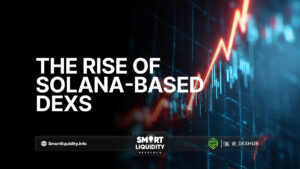How DEXs are Enabling Peer-to-Peer Trading


Decentralized Exchanges (DEXs) have rapidly gained popularity in the cryptocurrency world. They allow users to trade directly with one another, without the need for an intermediary such as a centralized exchange. This shift toward peer-to-peer (P2P) trading is revolutionizing the way people interact with digital assets. Here’s how DEXs are enabling this transformation.
Empowering Users with Control
Unlike centralized exchanges, where users deposit their funds into the platform, DEXs ensure that traders retain control over their assets. This is because transactions happen directly from one wallet to another, removing the need for a third party. Therefore, users can trade securely and anonymously, maintaining full control over their funds at all times.
Eliminating Trust Issues
One of the primary concerns in centralized exchanges is trust. Users must trust the platform with their assets, and any vulnerability in the system could lead to a hack or loss of funds. DEXs solve this issue by operating on blockchain technology, which is inherently transparent and secure. Since funds never leave the user’s wallet until a transaction is executed, the risk of losing assets to hacks or platform failures is significantly reduced.
Facilitating Global Access
Furthermore, DEXs break down geographical barriers. Traders from all around the world can engage in P2P trading without needing to meet any specific regulatory requirements. This openness allows for a more inclusive financial ecosystem, where anyone with an internet connection can participate. Whether you’re in the U.S., Europe, or Asia, you can trade with anyone, anywhere, at any time.
Promoting Financial Privacy
Another key advantage of DEXs is the emphasis on privacy. Centralized exchanges typically require users to verify their identity, which compromises anonymity. In contrast, DEXs allow users to trade with minimal personal information. This privacy-centric approach is increasingly important in today’s data-driven world.
Conclusion
In conclusion, decentralized exchanges are revolutionizing the way we trade digital assets. By enabling peer-to-peer transactions, enhancing security, and promoting financial privacy, DEXs are opening up new possibilities for the global trading community. As adoption continues to grow, we can expect these platforms to play an even bigger role in the future of finance.
DISCLAIMER:
“The information provided on this platform is for general informational purposes only. All information on the platform is provided in good faith; however, we make no representation or warranty of any kind, express or implied, regarding the accuracy, adequacy, validity, reliability, availability, or completeness of any information on the platform.”




